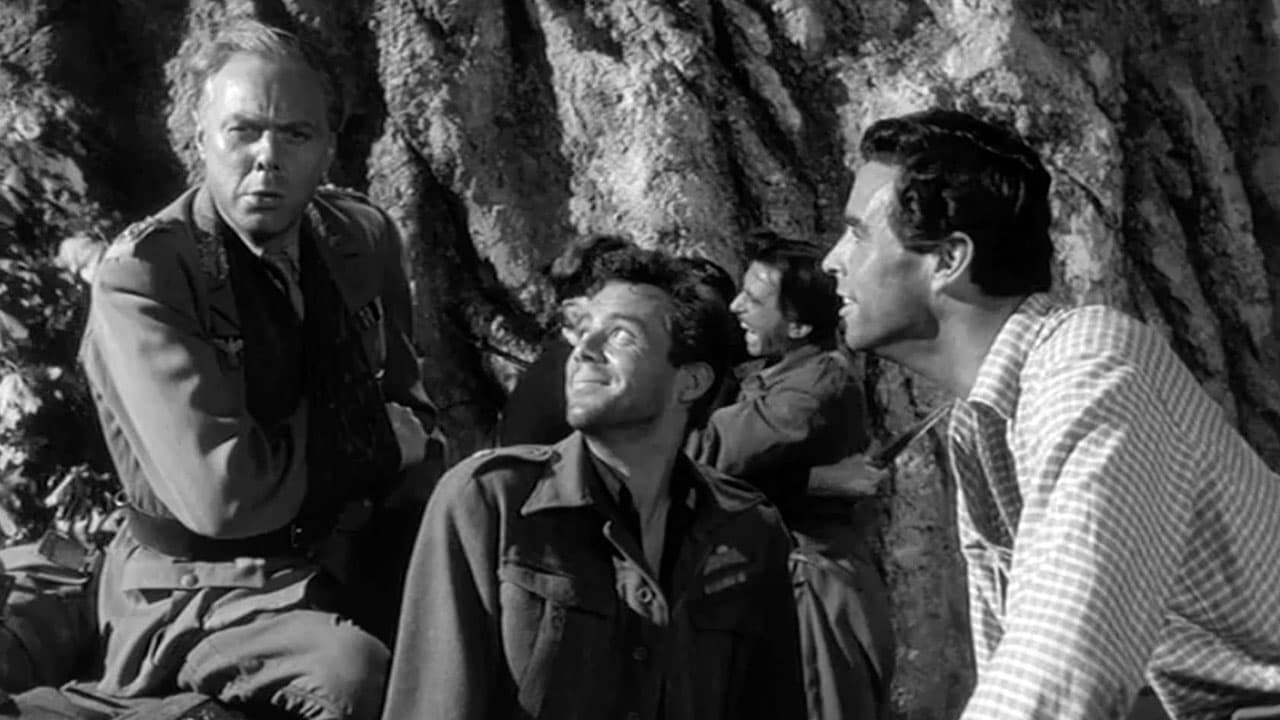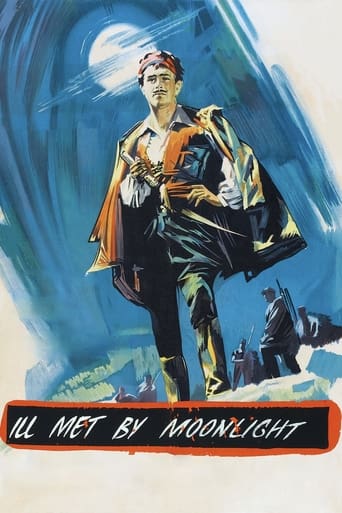2hotFeature
one of my absolute favorites!
Siflutter
It's easily one of the freshest, sharpest and most enjoyable films of this year.
Derry Herrera
Not sure how, but this is easily one of the best movies all summer. Multiple levels of funny, never takes itself seriously, super colorful, and creative.
Kamila Bell
This is a coming of age storyline that you've seen in one form or another for decades. It takes a truly unique voice to make yet another one worth watching.
GusF
Based on the 1950 book of the same name by W. Stanley Moss, this is quite an entertaining war adventure film but it could have been a great deal better. It tells the story of the kidnapping of General Heinrich Kriepe, the commander of the German occupation force on Crete, by Moss, his Special Operations Executive (SOE) colleague Major Patrick Leigh Fermor and the Cretan resistance in April 1944. However, it approaches the material with a light touch, incorporating quite a bit of humour and often seeming like a "Boy's Own" adventure. I don't have any problem with this approach but it is not executed as well as I would have liked. The film was released under the rather more obvious title "Night Ambush" in the United States.The script by Michael Powell and Emeric Pressburger is fairly good but there are a few structural problems. It was a mistake for the kidnapping to occur comparatively early in the film as the planning stages could have been much more interesting and it sometimes feels as if it has nowhere to go after that. The depiction of the kidnapping itself was apparently accurate but it was not depicted in a very exciting manner. After that, there is not much of a sense of suspense or tension as the two British officers and the Cretans evade the Nazi patrols comparatively easily. However, I did like the fact that there was a sense of mutual respect and admiration between the British and German forces, something which Powell and Pressburger explored in more depth in "The Life and Death of Colonel Blimp". While the writing is not up to their usual high standard, the duo's direction is as deft as ever. The film looks beautiful and it makes great use of the beautiful scenery of the south of France. Unfortunately, this was the final film that they made together under their production company, the Archers, but they later collaborated on "They're a Weird Mob" in 1966 and "The Boy Who Turned Yellow" in 1972.The film stars Dirk Bogarde in a characteristically excellent performance as Leigh Fermor, a colourful gentleman adventurer and scholar soldier of the old mould. Known as "Philedem" to the Greeks, he played a major role in helping to organise the Cretan resistance during the war. Bogarde brings all of the considerable charm and charisma at his disposal but Leigh Fermor was seemingly a larger than life figure and there are, at best, only a few hints of that in the script. Powell and Pressburger regular Marius Goring is very good as the honourable General Kriepe but I would have still preferred if their original choice Curd Jürgens had been cast instead. That said, Bogarde and Goring have good chemistry. Plus, their slight resemblance makes it easier to buy that Leigh Farmer could be mistaken for Kriepe in the dark than it would have been if the far larger Jürgens had been cast. David Oxley, probably best known for playing the small role of Sir Hugo Baskerville in "The Hound of the Baskervilles" (1959), is fairly dull and forgettable as Moss. In contrast to Bogarde, he is mostly charisma free. Cyril Cusack is great as Captain Sandy Rendel, who was not washed for six months and has the pungent smell to prove it. Wolfe Morris, Michael Gough and Laurence Payne are very good as Leigh Farmer and Moss' Cretan allies George, Manoli and Andoni Zoidakis respectively, even though Gough's Greek accent is practically non-existent. The film also features nice small appearances from former SOE operative Christopher Lee and Richard Marner (both of whom got to make use of their fluent German), George Pravda and an uncredited David McCallum in his film debut.Overall, this is a fun film belonging to the "men on a mission" World War II subgenre but I would have liked it if the Archers had bowed out on a stronger film.
ceo-652-974360
Admittedly, had I seen this film when it came out, then I probably would have given it an 8 instead of a 6. But looking at it from an older point of view over 50 years later, I was really disappointed.There are three categories of groups involved: The British, who have great plans to capture a German general and really believe they can drive through 22 German checkpoints with the General having a fit on the floor of the car without being stopped. They have no real plan, no communication system and seem to think the whole thing is "jolly good fun." Then we have the Greeks, who don't really understand that the whole thing is probably going to cause the SS troops to wipe out a few mountain villages in retaliation. They have nothing better to do than run around laughing and shouting, shaking hands and kissing everybody in sight. So instead of informing the group that about 500 German soldiers are just coming round the corner, it's better to greet long lost friends, before passing on the information. Top gag is of course having a drunken party in a house in the village in the night with a British officer in uniform eating a sheep's head at a table in the middle of the room. The place is filled with singing and dancing, the door isn't locked, they have no sentry .... Really makes the Greeks look completely incompetent and stupid. To say nothing of the British.And last but not least we have the Germans, who don't even bother to stop the General's car, filled with strange bearded men not in German uniform, as it goes through one checkpoint after another. Really made the Germans look completely incompetent as well. Which they certainly weren't.If you like this type of film, it can be watched as a relic of the past, but don't expect anything like logic or a real-life story; I had expected much more drama and far less incompetence combined with unintended ridiculous comedy.
jatrius
Yes , it does come from A Midsummer Night's Dream.This is because when the operation occurred, the British operators went under the codenames of Oberon, Titania and Ariel for the radio traffic back to Cairo. See Xan Fielding's memoirs as well as Lawrence Durrell's recollections of Paddy Leigh Fermor in Bitter Lemons, his reminiscences of the British campaign against EOKA in Cyprus in the late 50s.It's not that bad a movie as it absolutely avoids the mawkishness of a propaganda piece and has a semi-documentary feel to it. You must remember there was an entire SS division on the island against which the 5 Britons and about 800 partisans were ranged. It is not so much derring-do as in the vein of The Password is Courage, another excellent true - life drama of Bogarde's.
tim-482
Like 'Spleen', I first thought that we were seeing genuine Cretan landscapes. But what puzzled me was not being able to recognise any of it - even allowing for change - especially the coastline where Moss and his party landed. (In his book, he refers to a distinctive landscape) A little digging - on this site- revealed that the film was made in France and Italy with no mention of Crete. The title, 'Ill met by moonlight' surely refers to the 'meeting' of Kreipe and his abductors. The film couldn't really show the fact that Leigh Fermor and Moss et al attempted the abduction on the four evenings that preceeded the actual abduction. The earlier attempts were abandoned because Kreipe came along whilst it was too early for moonlight! (one wonders why was it necessary to change the title for the US market?) I thoroughly enjoy the film, watch it every opportunity and each time pick up something that I've missed previously. However, I cannot help but wonder how much better it might have been if the writers had stuck more closely to the original script throughout. They had informed advisers available, Micky Akoumianakis was a true participant, and Houseman was in Crete as an British agent for a long part of the occupation. Though thoroughly grounded in fact, the few 'elaborations' detract from what was surely a solid enough story to stand on its own.Regardless of the differences, I continue to regard the film as one of my most favourites.

